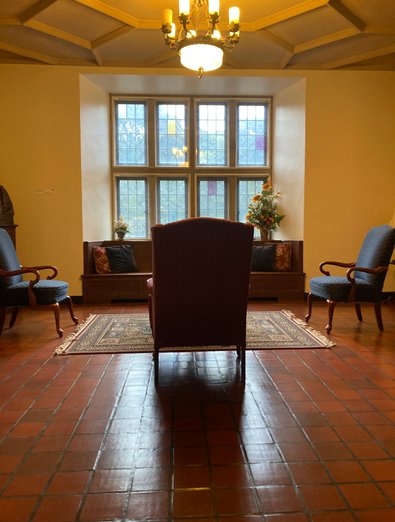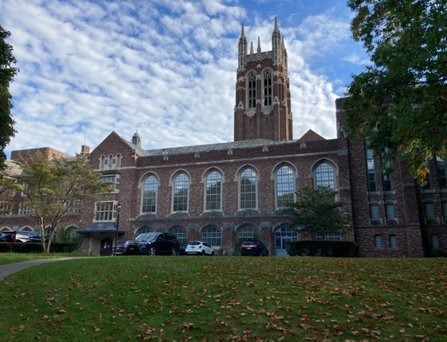585 857 9012
THE ROCHESTER
DEEP STRUCTURE PSYCHOTHERAPY CLINIC
MEET THE COUNSELOR
Dr. Oliver Boxell
M.S., Ph.D. (Cognitive Science), LMHCP, NCC
Clinical Office:
Deep Structure Psychotherapy Clinic, Room 314
Strong Hall
1100 South Goodman Street
Rochester, NY
14620
Email: oliverboxell@deepstructurepsychotherapy.com
Website: oliverboxell.com
Greetings, and a very warm welcome to the Rochester DSP Clinic! This clinic has been set up as a place for me to house the clinical side of my work, and I am absolutely thrilled that you are considering working with me as your counselor. I never cease to be struck by what a profound honor it always is to build a unique, trusting, and authentic connection with each and every patient. These connections enable us to have the honest discussions that are necessary to identify the real issues at hand; oftentimes these issues have been buried deep in the unconscious structures that our brains produce with its protective "defenses." Together, we will seek to uncover the key pieces of information that are leading to your problems, which typically involve core emotions and thought patterns about people and situations. This will help us to figure out different strategies that can help you reorganize the relevant information and make real progress in resolving the issues.
While we will use longstanding forms of psychotherapy to guide our sessions, like cognitive-behavioral and psychodynamic therapy for instance, the exciting aspect of this clinic is that we will be aiming to boost their effectiveness and robustness using the brain's natural mechanisms for changing the information it produces (so-called "deep structures"). For more information about the DSP approach, see the About DSP page on this site.
I already have a personal website that details my academic and clinical credentials, as well as my research and teaching, so I'll refrain from going into that much here. If you are interested, please feel free to check out oliverboxell.com. The highlights are that I am the Robert L. and Mary L. Sproull Fellow in the Department of Counseling and Human Development at the University of Rochester, I hold a Ph.D. in Cognitive Science, and am nearing completion for a Ph.D. in Counseling (CACREP Accredited). I also hold an M.S. in Mental Health Counseling (CACREP Accredited), and am a Board Certified by the National Board for Certified Counselors.
I would like to take this opportunity to thank-you once again for checking out this website. I hope you find it informative, and if you are in need of some mental health assistance, I hope you'll give some thought to this clinic as a place to turn. It is the first of its kind anywhere in the world, and I would be genuinely excited to see how the models and techniques of DSP can help you improve your mental wellbeing and quality of life.
Oliver is currently accepting patients with a wide range of mental health disorders, examples of which include the following: depression, bipolar and related disorders, anxiety, post-traumatic stress, adjustment disorders, schizophrenia spectrum and dissociative disorders, attachment disorders, gender dysphoria, eating disorders, chronic pain, somatoform disorders, obsessive-compulsive spectrum disorders, personality disorders
Oliver has extensive experience working with a broad range of different ages and social and cultural groups from across our society. This is a fully inclusive clinic and sensitively considering the lived experiences of people is instrumental to the process, including but not limited to races, genders, ethnicities, physical and mental abilities, sexualities, neurodiversities, age group and generational cohorts, working backgrounds, places-of-origin (domestic and international; urban and rural), belief systems, and more.
Clinic Location
The Rochester DSP Clinic is housed in the historic Strong Hall building at 1100 South Goodman Street in Rochester, NY. You can get directions on Google Maps. The building is easily accessed from across Rochester and the surrounding areas, and has a very interesting history and is set in beautiful grounds. It is on the campus that was previously the site of the former Colgate Divinity School, and so it is important to be aware that some maps, GPS, and signage may not yet have been updated. Please also note that both the campus generally, and the Rochester DSP Clinic itself, are not affiliated with the Divinity School in any way.
When you arrive at Strong Hall, you will either drive or walk up to the main entrance (pictured) from South Goodman Street. There is a large parking lot, which is free. At the main door, select the option on the keypad for the clinician you are here to see (e.g., Oliver Boxell). The door will then open for you.
Typically, you will be able to go straight into your session. Occasionally, if you happen to arrive a little early and the previous session is still finishing up for example, you may be asked to wait in the waiting area for a few minutes. This can be avoided altogether with careful scheduling. Finally, note that the clinic is accessible via both elevator and staircase.
Waiting Area
Counseling in rochester, ny
- If you decide to attend counseling with Oliver at the Rochester Deep Structure Psychotherapy Clinic, your sessions will last for around one hour.
- You and your counselor will identify the abstract information (core deep structures) that will become the targets for change in your course of psychotherapy. These deep structures will relate both to your feelings about people and your thought patterns about people and situations.
- The sessions presently offered at the clinic utilize "psychodynamic" techniques to guide the conversation toward feelings about people, and "cognitive-behavioral" techniques to guide the conversation toward thought patterns about people and situations.
- Specific deep structural techniques will be used to help your brain reorganize the deep structures as they are activated by the different traditional psychotherapy approaches. The deep structural techniques involve the use of specific verbal statements, images, or sounds that the counselor will present to you at particular moments in the session to "prime" the intended change you aim to experience. The process is completely non-invasive, and is actually just a more direct route to achieving what all counseling is trying to do because it is more synchronized to brain structure and function.
- As is the case for all counseling, the therapist and participant build a working alliance together that underpins mutual trust and respect. As such, these sessions are also grounded in "humanistic" principles that promote warmth, positivity, genuineness, and empathy.
- People often find that meaningful psychotherapy brings up difficult emotions and memories, but the focus of DSP on priming unconscious change means this form of psychotherapy can be a more comfortable experience while still pursuing profound results. This is because the restructuring going on "under the hood" aims to address the painful information that is being outwardly defended, until the defenses no longer serve a purpose and can be safely lowered.
- The idea is that patients will simply experience new patterns of thought, feeling, and behavior emerging from underlying changes in deep structure and, in turn, personal growth and improvements in well-being and quality of life.
Technology
Unlike many other approaches to psychotherapy, DSP does not ask you to complete any "homework" between sessions. However, we will provide you with some cutting-edge technology to use free-of-charge. You will be asked to view a very short two-minute "stimulus set" on a computer, cell phone, or tablet once each day, right before you go to bed. The "stimulus set" will just be a set of statements and pictures. Your counselor will provide you with a personalized stimulus set to watch, and the idea behind this is to maintain the deep structural re-organization processes between the in-person sessions.
Data
DSP works with unconscious information structures, and so we need to measure how these are changing over time. The data we collect helps us to track your progress toward your goals, and to make decisions about how your treatment should proceed. As such, you will be asked to complete a small online survey each week, at some point in the 24 hour period prior to your in-person session. In addition, we will ask your permission to add your data to a large sample of anonymous data that we can use to assess the overall effectiveness of DSP in ongoing research on the techniques. You are under no obligation to agree to this at all, but it is a great opportunity to contribute to some innovative science. Your data will be fully de-identified at all times because an encryption system is used for it, meaning that it is always completely anonymous and your confidentiality is fully protected. The weekly survey should take no longer than 10 minutes to complete.
Main Entrance to Strong Hall
Fees
$110 per one-hour session (based on the median rate in Rochester, NY)
A sliding scale program is available; email contact@deepstructurepsychotherapy.com for more information.
Insurance Coverage
In common with most small practices that do not have a billing department, we regrettably do not have the resources to bill insurance plans directly. However, insurers will often reimburse patients for the cost of attending counseling as an out-of-network service when patients submit their paid "superbills." Ask for more information. In addition, note that we are able to accept HSA and FSA cards as a form of payment.
CONTACT US
Do you have questions you would like to ask about the Rochester DSP Clinic? You can call 585 857 9012, email contact@deepstructurepsychotherapy.com, or complete this form.


